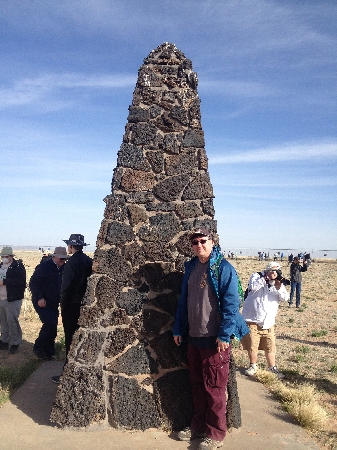WIU Faculty Member Reflects on Social Impacts of Atomic Bomb at International Conference
September 22, 2015

WIU Emergency Management Associate Professor Jack Rozdilsky standing next to the obelisk designating the Trinity Test Site (April 2015). The site is the exact location for ground zero, where the world's first atomic bomb was detonated on July 16, 1945.
[Download Print-Quality Image]
MACOMB, IL — Last weekend, a Western Illinois University faculty member shared his reflections about the development of the atomic bomb at the "70 Years After Hiroshima: Conceptualizing Nuclear Issues in a Global Context" international conference in Canada. Emergency Management Associate Professor Jack Rozdilsky presented at the interdisciplinary conference (sponsored by the Prince Takamado Japan Centre at the University of Edmonton, Alberta) at the invitation of a group of eminent scholars. His reflections focused on the social impacts of the atomic bomb.
According to Rozdilsky, the conference addressed the philosophical and historical questions about the development of atomic weapons in the 1940s to conceptualize and analyze the relationship between the atom bomb and humans over the last seven decades. His presentation, "A Case Study of the Trinity Test Site," provided a qualitative look at the specific place where the first atomic weapon was developed and detonated in 1945.
"It all began here in Illinois, with the first sustained nuclear chain reaction that took place at the University of Chicago in 1942. After the initial nuclear experiments in Chicago, Manhattan Project scientists, led by Dr. J. Robert Oppenheimer, created the world's first atomic bomb in 1945," Rozdilsky said. "2015 is an important year to reflect on these topics, as it is a milestone year that marks significant events in human history, including the 70th anniversary of the July 1945 detonation of the world's first atomic bomb at the Trinity Test Site in New Mexico. When witnessing the flash at the test site, Dr. Oppenheimer reflected on the momentous event by saying, 'Now I become death, the destroyer of worlds,' quoting from Hindu scripture in the Bhagavad Gita. This year is also the 70th anniversary of the Aug. 6 and 9 atomic bombings of Japanese cities during World War II," he added.
In Spring 2015, Rozdilsky traveled to the Trinity Site, a remote New Mexico desert location. While on site—now a radioactive crater within a restricted military zone on the White Sands Missile Range—Rozdilsky studied the characteristics of the unique area.
"The Trinity site simultaneously represents one of mankind's greatest scientific accomplishments, along with one of mankind's most vexing moral dilemmas," he noted. "Now that we have harnessed the power of the atomic bomb, when—if ever—is it ethically justified to use these weapons of mass destruction against cities?"
Rozdilsky said these topics are incorporated into emergency management coursework at both the WIU-Macomb and WIU-Quad Cities campuses.
"Modern emergency management was developed as the nation grappled with the threat of nuclear annihilation. The 1950s-era Cold War civil defense programs are the direct precursors to present day emergency management and homeland security," he said.
The WIU Emergency Management Program, situated in the WIU Dept. of Health Sciences and Social Work, is unique, as it provides students with the necessary social and historical context for the events that make up the foundations of modern emergency management practice."
For more information, contact Rozdilsky at (309) 298-1621 or via email at JL-Rozdislky@wiu.edu.
To learn more about WIU's emergency management bachelor's degree program — the only one of its type in the state — visit www.wiu.edu/coehs/health_sciences/undergraduate_programs/em/.
Posted By: University Communications (U-Communications@wiu.edu)
Office of University Communications & Marketing

Connect with us: